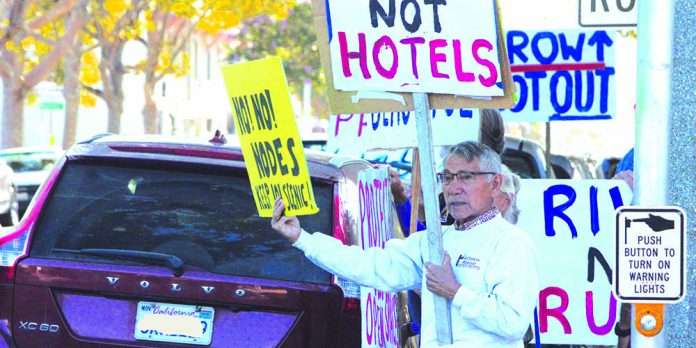Opponents vowed to fight the county supervisors’ unanimous approval Sept. 24 of zoning changes at four Highway 101 interchanges.
The four commercial “nodes,” as they are called by planners, are located at the Betabel Road and Highway 129/Searle Road interchanges in San Juan Bautista, and at the Rocks Ranch and 101 Livestock Market interchanges in Aromas. A “node,” as defined by the county, is “a concentration of development at or within a reasonable distance of an intersection or interchange.”
Opponents, who primarily live in Aromas and San Juan Bautista, contend that such development would negatively impact the rural character of the busy highway corridor.
During the supervisors’ meeting on Sept. 24, multiple members of the citizens group Preserve Our Rural Communities said they would begin to circulate a referendum petition.
San Felipe Road resident Richard Wist said the group has asked “hundreds” of San Benito County residents about the nodes, with a “30-1” proportion saying they opposed them.
“Our goldmine here is the beauty and small-town atmosphere of our county,” he said. “We are just going to ruin it and spoil it with this development.”
County officials, meanwhile, see the revenue generated from possible development along Highway 101 as a way to sustain and grow county services.
Supervisor Anthony Botelho said the zoning code is “the most restrictive and detailed zoning ordinance in the state,” adding that it includes environmental protections the opponents are promoting. The nodes already have some form of development, he said, adding that the Betabel RV campground was once a junkyard.
“We need to have an opportunity to take advantage of this corridor for a number of reasons, and guess what? The environment is still rural and protected with the zoning ordinance that has set the standards of what is going to be there in the future,” he said. “It’s a critical mistake the PORC folks are making in opposing this zoning ordinance. Without this we don’t have any means of protecting this corridor.”
Zachary Walton, an attorney representing the property owners, said any challenge to the Sept. 24 decision, whether litigation or a referendum, would be restricted only to the zoning code change itself, not the 2015-approved General Plan, which encouraged the development of commercial zoning at the interchanges.
“That decision has already been made,” Walton said. “The statute of limitations is long past.”
New commercial development will not be happening anytime soon. Each proposed development would need approval of a master development plan, which outlines the property’s site plan and landscaping, among many other things.
No specific plans for any of the nodes have been submitted, according to the county.











The road from San Juan Bautista going east is stop and go every day. It needs to be 4 lane and removing the stop lights by making overhead cross roads such as Union road.
Friends, What we witness is COG’s Directors’ intentional blindness. We remain the largest urban area on the North American Continent, Silicon & Salinas Valleys combined, without intermodal facilities. We used to have two: one in San Jose at the corner of Taylor & Coleman Ave (the piggyback ramp I supervised on the Graveyard Shift 1966-70), and the one in downtown Salinas near the Amtrak depot, both operated by SPRR’s subsidiary Pacific Motor Trucking. But, since we got unelected “Authorities” stuck on taxpayers’ backs, e.g., COG, VTA, TAMC, SCCRTC, etc., we went from having transportation planned by people who know transportation, to transportation planned by “transit first” radical socialists, who never even consider private-sector transport options. As long as we let our local leaders violate our constitutional rights as they do at COG, VTA, TAMC, etc., then we will not have the positive benefits of private-sector transportation options. At present, EB or WB tonnage flows to and from these two Valleys on the Central California Coast Region have to be drayed to and from the ramps in Lathrop (UPRR) or Stockton (BNSF). As COG calls this “success,” it means greater highway construction and maintenance expenses because axle weight is the largest single factor in road surface and bridge support deterioration. That means COG, VTA, TAMC, SCCRTC, AMBAG, are the largest source of air pollution and highway congestion and delays. But they refuse to even put private-sector solutions on their agendas—I tried to get them to do it for ten years before giving up going to their meetings. Caveat viator. Joseph P. Thompson, Esq., Past-Chair, Legislation Committee, Transportation Lawyers Assn., 408-848-5506; E-Mail: Tr******@*****ll.Net